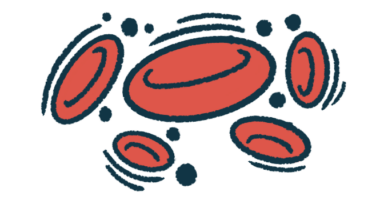3 concerns I have as my daughter learns about my PNH diagnosis
When do I ease her concerns — and how — as she begins to notice my life?

Becoming a parent has taken me through a range of emotions, prompting new fears, thoughts, and views of my life — including about how my disease will affect my family.
When I became pregnant in 2021, I started to picture several scenarios relating to my future child (or children) and my paroxysmal nocturnal hemoglobinuria (PNH). Having this disease affects my life every day, and I’m realizing how much it will affect my daughter, Joelle, as well. Will she understand why I need frequent breaks, use a wheelchair at amusement parks, or have to pass on playtime sometimes because I don’t have enough energy?
My husband, John, and I have been discussing how aware we want our daughter to be about my condition. We wondered if sheltering her was an option from an “ignorance is bliss” standpoint, but have decided against it. We want our daughter to know about PNH, but we’ll have to consider her perspective as we go. I don’t think this part of the parenting process will be easy, but I’m lucky to have my husband by my side as we navigate this journey.
I’ve categorized my three primary concerns when it comes to my daughter and my PNH.
Explaining PNH
I often think about explaining PNH to my daughter. I want to find a good balance between discussing its seriousness and finding words that won’t scare her.
My plan is to go over it as simply as possible with my extra-loving, high-pitched mommy voice: “Mommy has a rare blood disorder that makes her extra special. She’s one in a million! She has to go to the doctor to get medicine every two months to help her feel better, but there are still days when she may not feel her best.”
As Joelle gets older, I’ll offer more detail about the mechanics of the disease. But for now, when she’s only a year old, I think this approach may be a good start.
Still, John and I wonder what age she should be when we have this conversation. I want her to know about PNH early in her life, so she can communicate if she sees something going on with me or symptoms of mine that concern her. But how early should that be?
We’re thinking of keeping PNH in our everyday conversations, as we currently do, so the name isn’t foreign to her. When she asks or when the opportunity presents itself, we’ll be ready to explain what it is.
Handling illnesses
Joelle will inevitably get sick sometime, especially once she starts school — since any school is considered a petri dish because of all the germs traveling around a classroom. When that happens, I’m worried that my “mom instincts” to care for her will cloud my judgment about my own vulnerability to illness, given my weakened immune system from PNH.
When my husband gets sick, depending on what it is and its severity, I might wear a mask to avoid catching what he’s got. But I don’t want my daughter to worry if she sees me wearing one or limiting physical contact, including hugs. I don’t want her to view me as a fragile doll as she grows up; I just want her aware that Mommy has to be careful with germs.
Receiving treatment
My last fear about parenting with PNH is Joelle seeing me in a medical setting, specifically for my Ultomiris (ravulizumab-cwvz) treatments. An infusion center isn’t necessarily kid-friendly, and I’d like to say that she’ll never go to any treatment with me.
But then I think about my terrible medical anxiety growing up. Maybe if Joelle sees Mommy being brave while getting an IV and having bloodwork done as often as I do, she’ll be empowered to be brave when she goes to the doctor, as well.
Further, I think that showing her the places where I’m treated, the wonderful nurses who take care of me, and of course the delicious snacks and games I play could help her feel comfortable about her mom having PNH. Since she’s still so young, I can wait to decide on the timing of these visits, but I do wonder about when they’ll be appropriate.
What are your thoughts about these difficult parental decisions? Please let me know in the comments below.
Note: PNH News is strictly a news and information website about the disease. It does not provide medical advice, diagnosis, or treatment. This content is not intended to be a substitute for professional medical advice, diagnosis, or treatment. Always seek the advice of your physician or other qualified health provider with any questions you may have regarding a medical condition. Never disregard professional medical advice or delay in seeking it because of something you have read on this website. The opinions expressed in this column are not those of PNH News or its parent company, Bionews, and are intended to spark discussion about issues pertaining to paroxysmal nocturnal hemoglobinuria.








